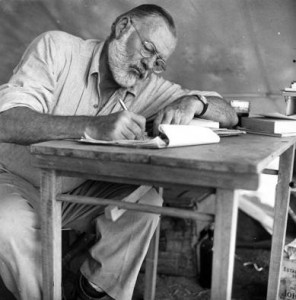Writer E.B. White “was troubled by the absolutism of such rules” as set out in Strunk & White’s Elements of Style, says BrainPickings.org*.
White would respond to letter writers who had questions, comments, complaints, and compliments about the different rules and dictums set forth in the book that every college freshman buys, skims, and then never reads again.
“Avoid needless words,” was S&W’s admonishment to the blatherers in English Comp classes.
“Write down to the bones,” said every college journalism professor. “Scrape off all the fat.”
Problem is, this approach oftentimes results in the very life of the language being sucked right out of the piece. It’s the rhythm of the language that makes it enjoyable to read.

Would Ernest Hemingway Make a Good Poet?
I decided a long time ago that my writing style would be concise and simple. Hemingway-esque. Avoid adverbs, that sort of thing. (Although I’m still a sucker for a well-placed adjective.)
This contradicts the writing style students are being taught in colleges and universities: utilizing multi-syllabic, complex words that very few people, including the professor truly understood, but make you sound erudite; long, meandering sentences that endeavor to explain and clarify one’s thoughts with as many extraneous words as possible, which make you sound educated; and, whackingly long Faulkner-esque paragraphs that, when printed out on standard paper, can wipe out an entire rain forest, with bonus points being granted if you can use one sentence for a multi-line paragraph, like this sentence here.
This isn’t writing, it’s vocabulary vomiting. Students are being told that in order to communicate “effectively,” they have to use big words. As a result, when I meet a new graduate who wants to be a writer, this is the first habit I break them of, and teach them to use simpler, more vivid picturesque language. There’s a place for simplicity, but also a place for the beauty of the language.
This usually brings us to a different problem, where writers — especially nonfiction writers — are taught to avoid all adverbs and adjectives, even metaphors and similes, for the sake of simple, scientific, logical writing. (They are all then put into boxes and delivered by the truckload to the Creative Writing department, but that’s a different blog post.)
Use Language’s Natural Rhythm
The problem with this oversimple, journalistic-style writing is the language tends to be dry. Describe the facts, without hyperbole or exaggeration. Present them in the fewest words as possible to save on column inches and to keep readers involved as long as possible.
But, what about the poetry of language? Language has a natural rhythm that makes some words a better fit than others. Some writers are masters at this, and Hemingway was one of the few who could find the rhythm in his sparse style. Other people who do it well are speechwriters. Ted Sorensen, John F. Kennedy’s speechwriter, excelled at it, as did Reagan and Clinton’s speechwriters.
As White said in a letter in his book, The Letters of E.B. White:
It comes down to the meaning of ‘needless.’ Often a word can be removed without destroying the structure of a sentence, but that does not necessarily mean that the word is needless or that the sentence has gained by its removal.
If you were to put a narrow construction on the word ‘needless,’ you would have to remove tens of thousands of words from Shakespeare, who seldom said anything in six words that could be said in twenty. Writing is not an exercise in excision, it’s a journey into sound. How about ‘tomorrow and tomorrow and tomorrow’*? One tomorrow would suffice, but it’s the other two that have made the thing immortal.
Writing is a “journey into sound.” That’s the natural rhythm of language. Tap into it, and people will read your work, long after they swore they would quit. Many times I’ve found myself promising to only read 10 pages before I go to sleep, only to look at the clock and see that two hours have passed.
Roger Angell, the baseball writer for The New Yorker, is a master at finding rhythm, but doing it in long sentences. He uses 80 words to weave an Appalachian Trail of a sentence to make you feel like you’re sitting at the ballpark with him. He still needs every word to do it though. There are very few “needless words” in a Roger Angell article.
Simple Writing is Not Stripped Down Writing
Simple writing is not just striking out everything but nouns and verbs. It means choosing the very best words.
It’s like how a minimalist decorates their house: they don’t have just a TV and a couch in the living room. They’ll also have books on a bookshelf, but only 50 of their most favorite books in all the world.
Simple writers may use only a few words, but they use the right words that convey exactly what they want to say. They don’t explain the words they use, they use the richest words that hold the most meaning.
The secret to writing poetically and with brevity is to find the most vivid words with the deepest meaning to properly convey the message, and tap into the their rhythm to carry your thoughts.
* If you’re a writer, or you care about words, read BrainPickings.org every day, and subscribe to the newsletter. Also, follow @BrainPicker on the Twitter.